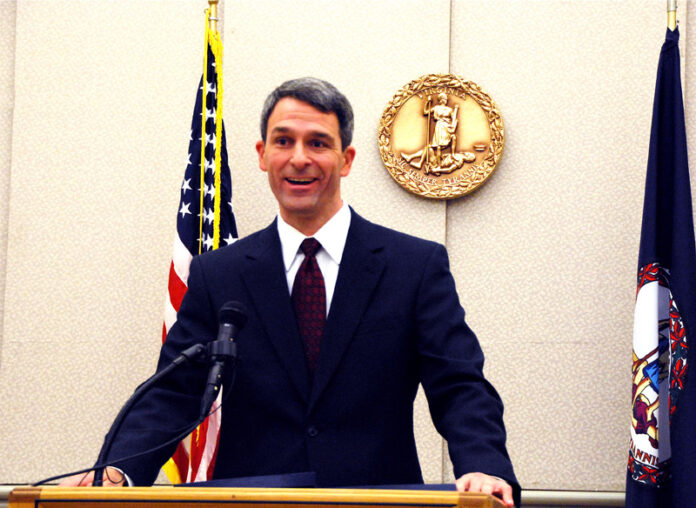Ken Cuccinelli held a conference call following the hearing before the U.S. 4th Circuit Court of Appeals Tuesday. “The 4th Circuit Court of Appeals is a ‘hot bench’ – it was very aggressive on both sides,” said Cuccinelli.
A three-judge panel made up of Democratic Presidential appointees “struggled with the unprecedented nature of the exercise of the authority the federal government was trying to undertake in legislation, [the Patient Protection and Affordable Care Act, PPACA], said Attorney General Ken Cuccinelli.
“Being ‘pounded by judges’ on the issue of the state’s standing and the Commerce Clause was expected, remarked Cuccinelli. The Commerce Clause and the interpretation of “activity and inactivity” across state lines took up much of the courts time. In an earlier interview Cuccinelli stated that “If our mental activity – our decision not to do something is regulatable by congress … that’s incredible.”
Cuccinelli said he observed a “shift in [the court’s] thinking … a broader deeper understanding of our position with respect to standing.” He felt that his argument was successful, though he admitted it is dangerous to become too optimistic on what is observed in the courtroom.
The Liberty University case was argued first. They lost in the Western District of Virginia where the state won in the Eastern District. Liberty argued on the merits of the constitutional question, the Commerce Clause and the tax versus penalty argument.
Virginia, on the other hand argued that they were defending state law.
Virginia passed its own law in 2010 that exempts employees from being mandated to participate in a private employer sponsored healthcare plan as a condition of employment. The panel challenged Cuccinelli on the reason for the law, insinuating that it was passed for the sole purpose of challenging the PPACA.
Cuccinelli explained that the federal government, by mandating that all Virginians purchase healthcare, is in direct conflict with the Commonwealth of Virginia’s law. Federal law trumps state law when there is a conflict except when the federal law is unconstitutional.
“The Constitution’s limitations on federal power means something,” Cuccinelli said. “It sets the United States apart from other countries.” He takes the position that he is simply was upholding the constitution.
“At the same time I understand that people want more affordable healthcare and I sympathize with people that can’t afford it,” said Cuccinelli. “As attorney general sworn to uphold the law, I can’t endorse giving away the rights of all so that some people will get more healthcare. There are better solutions then giving up our freedom,” he said.
Governor McDonnell is preparing for the mandate. If the U.S. Supreme Court strikes the PPACA, the preparation costs will be wasted. “We need to resolve this case as quickly as possible for the good of our people and the economy,” said Cuccinelli. That was the reasoning Cuccinelli gave when he requested the case be expedited directly to the U.S. Supreme Court. That appeal was denied April 25.
Tuesday’s hearing results will come sometime this summer with the U.S. Supreme Court hearing the case in June 2012. He expects other cases to be heard at the same time.
Cuccinelli claimed that the PPACA had an “enormous effect on the 2010 elections … and it remains to be seen how big an impact it will have on the 2012 elections.”
“If the PPACA is struck down in 2012 prior to the presidential election,” he asked rhetorically, “what is the reaction to that … the timing is sort of extraordinary.” He hoped to see other alternatives “teed up” and ready to be addressed by Congress.
It is at the sole discretion of the U.S. Supreme Court whether they will accept or reject hearing the case. Cuccinelli believes it would be “highly unlikely that the case would be delayed beyond [2012].
He called the PPACA a “sloppy way to legislate” and hoped congress would reconsider and pick one thing at a time to enact. Cuccinelli said that Virginia’s health care insurance is more expensive due to the piling on of mandates. “It’s the difference between broad coverage that more people can afford or narrower coverage that less people can afford,” he said.
Without the individual mandate, the PPACA cannot stand on its own.


